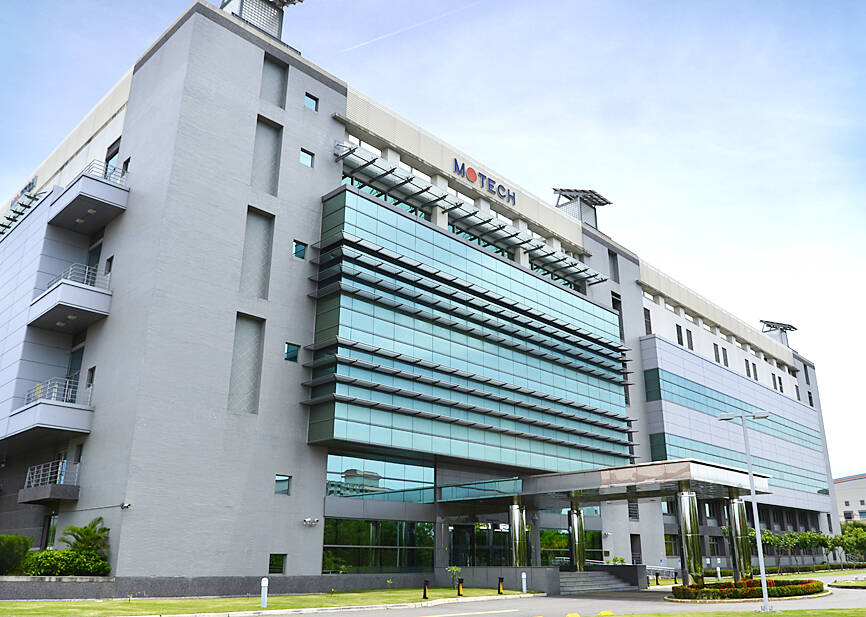Solar cell and module maker Motech Industries Inc (茂迪) is expecting improved revenue momentum this year due to increased solar panel installations, snapping three consecutive years of slowdown.
Revenue fell 20.7 percent last year as local solar panel installations dipped 30 percent from 2023 after the government slowed its review process due to a series of scandals linked to land acquisition and solar panel deployment. That dashed the hopes of a recovery by local solar companies, Motech said.
“In 2025, we aim to add 10 megawatts of solar installations, targeting government solar projects and large-scale rooftop projects from the private sector,” Motech chief financial official Ting Wang (王丁召) told investors during a videoconference yesterday.

Photo: Chang Hui-wen, Taipei Times
Motech last year helped customers install 68 megawatts of solar panels, up from 34 megawatts of solar panels installed the year before. That helped boost solar system installation’s revenue contribution to 9 percent last year, from 5 percent the previous year, it said.
The company is cautious about this year’s order visibility, given lukewarm government support. The green energy industry is heavily dependent on government support to expand, it said.
Motech expects to secure orders from this month to May, and would also continue seeking business opportunities in overseas markets, Wang said.
Overseas demand mainly from Japan and Europe contributed about half of the company’s revenue last year, he said.
The company is in discussions about new orders with Japanese customers, he added.
Motech’s net profit expanded 7.9 percent last year to NT$235 million (US$7.15 million), from NT$128 million in 2023. Earnings per share rose to NT$0.61 from NT$0.56.
Gross margin improved to 19.7 percent from 16.7 percent in 2023, as it gained more solar system installation business, which delivered a better margin than its corporate average.
The company hopes to keep gross margin similar to last year’s level, thanks to increases in solar installation orders and stable solar prices in the local market, Wang said.
Local peer TSEC Corp (元晶) reported a net profit of NT$70.5 million during the first three quarters of last year, down from NT$432 million a year earlier.
TSEC has not released full-year financial results.
United Renewable Energy Co’s (聯合再生) losses widened to NT$1.92 billion, or losses per share of NT$1.14, during the first three quarters last year, compared with losses of NT$1.72 billion in the same period of 2023.

SETBACK: Apple’s India iPhone push has been disrupted after Foxconn recalled hundreds of Chinese engineers, amid Beijing’s attempts to curb tech transfers Apple Inc assembly partner Hon Hai Precision Industry Co (鴻海精密), also known internationally as Foxconn Technology Group (富士康科技集團), has recalled about 300 Chinese engineers from a factory in India, the latest setback for the iPhone maker’s push to rapidly expand in the country. The extraction of Chinese workers from the factory of Yuzhan Technology (India) Private Ltd, a Hon Hai component unit, in southern Tamil Nadu state, is the second such move in a few months. The company has started flying in Taiwanese engineers to replace staff leaving, people familiar with the matter said, asking not to be named, as the

The prices of gasoline and diesel at domestic fuel stations are to rise NT$0.1 and NT$0.4 per liter this week respectively, after international crude oil prices rose last week, CPC Corp, Taiwan (台灣中油) and Formosa Petrochemical Corp (台塑石化) announced yesterday. Effective today, gasoline prices at CPC and Formosa stations are to rise to NT$27.3, NT$28.8 and NT$30.8 per liter for 92, 95 and 98-octane unleaded gasoline respectively, the companies said in separate statements. The price of premium diesel is to rise to NT$26.2 per liter at CPC stations and NT$26 at Formosa pumps, they said. The announcements came after international crude oil prices

A German company is putting used electric vehicle batteries to new use by stacking them into fridge-size units that homes and businesses can use to store their excess solar and wind energy. This week, the company Voltfang — which means “catching volts” — opened its first industrial site in Aachen, Germany, near the Belgian and Dutch borders. With about 100 staff, Voltfang says it is the biggest facility of its kind in Europe in the budding sector of refurbishing lithium-ion batteries. Its CEO David Oudsandji hopes it would help Europe’s biggest economy ween itself off fossil fuels and increasingly rely on climate-friendly renewables. While

SinoPac Financial Holdings Co (永豐金控) is weighing whether to add a life insurance business to its portfolio, but would tread cautiously after completing three acquisitions in quick succession, president Stanley Chu (朱士廷) said yesterday. “We are carefully considering whether life insurance should play a role in SinoPac’s business map,” Chu told reporters ahead of an earnings conference. “Our priority is to ensure the success of the deals we have already made, even though we are tracking some possible targets.” Local media have reported that Mercuries Life Insurance Co (三商美邦人壽), which is seeking buyers amid financial strains, has invited three financial